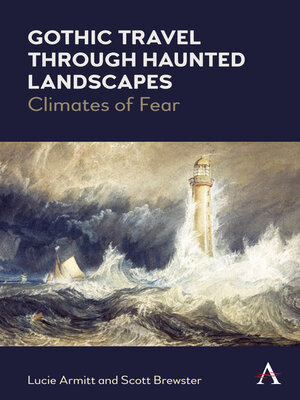Gothic Travel through Haunted Landscapes
ebook ∣ Climates of Fear · Anthem Studies in Gothic Literature
By Lucie Armitt

Sign up to save your library
With an OverDrive account, you can save your favorite libraries for at-a-glance information about availability. Find out more about OverDrive accounts.
Find this title in Libby, the library reading app by OverDrive.



Search for a digital library with this title
Title found at these libraries:
| Library Name | Distance |
|---|---|
| Loading... |
This book argues that the process and experience of travel in Gothic literature provides a unique and transformative perspective on the relationship between fear and recurring cultural preoccupations from the late eighteenth century to the present, ranging from concerns about climate change or the presence of the unseen to the negotiation of cultural difference and the apprehension produced by various modes of modern transport and unknown/unknowable terrain. The book follows travellers who take many fictional forms – tourists, commuters, walkers, explorers, as well as the 'armchair tourist' or reader – as they encounter fascinating, strange and often disconcerting weathers, climates, landscapes and topographies. Gothic travel epitomises the wonder, excitement, suspicion or incomprehension that arises from journeys through familiar and unfamiliar terrain. While exposure to the wild, elemental or primitive could produce the elevation of the sublime in early Gothic, increasingly the experience of travel raised unsettling questions about people, places and environments that lay beyond established frames of knowledge. Gothic travellers are haunted, never alone, and the experience of journeying through these landscapes provokes fears that may shadow them even after they have returned to 'home' ground. Climates of Fear reveals the persistent ways in which Gothic narratives of travel confront fears about the environment, surveillance, (im)migration and the foreign. These abiding concerns speak loudly to the present time, however, when the encroachments on our immediate surroundings – from climate change, digital communication and geopolitical dislocation – seem at once remote and intimate, invisible yet urgent. Thus the book also asks whether recent portrayals of Gothic journeys now pose different questions to the reader.
|Gothic has often articulated fear as much through its depictions of weather, climate and landscape as it has through its typical monsters, and the relationship between geography, the environment and travel has been a persistent characteristic of the Gothic from its earliest moments. Gothic is an innately travelling mode of writing, and the literary fascination provoked by armchair travel is central to the navigation of cultural fears: 'strangeness' only becomes apparent once one exchanges the homely (Heimlich) for the uncanny in new or uncharted settings. This book will argue that what differentiates Gothic travel from all other kinds is the growing realisation that the terrain across which one journeys has become 'haunted' by what one finds there. At the same time, that encounter similarly transforms the traveller 'for good': whatever ghosts we encounter abroad follow us home and take root in our collective consciousness. This book therefore argues that Gothic literary travel plays a key role in giving expression to a range of very 'real' haunting anxieties. The strange and discomforting landscapes into which our reading propels us allow those anxieties to take form while, in turn, our experience of journeying through these landscapes enables us, in part, to confront the fears they provoke.
This book argues that the process and experience of travel in Gothic literature provides a unique perspective on recurring cultural preoccupations from the late-eighteenth century onward, ranging from concerns about climate change or the presence of the unseen to the negotiation of cultural difference and the apprehensions produced by various modes of modern transport. The book follows travellers who take many fictional forms – tourists, commuters, walkers, explorers, as well as the 'armchair' tourist or reader – as they...







